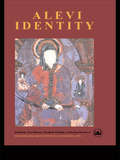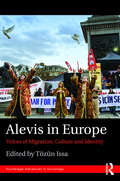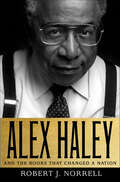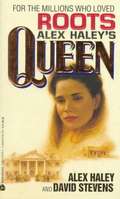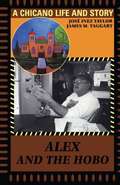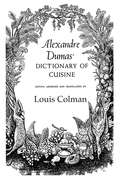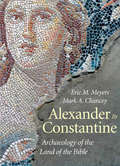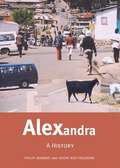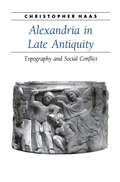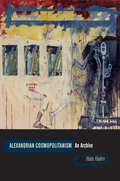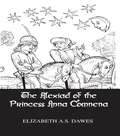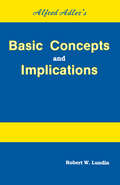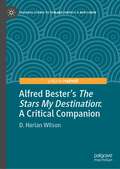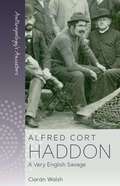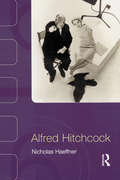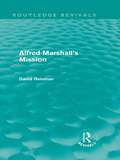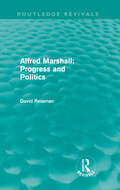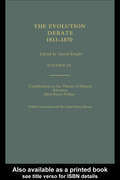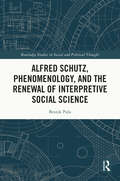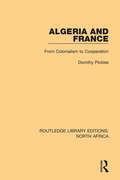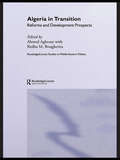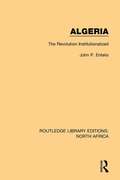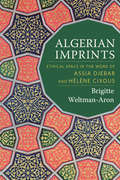- Table View
- List View
Alevi Identity: Cultural, Religious and Social Perspectives
by Catharina Raudvere Tord Olsson Elisabeth OzdalgaIn the rising momentum for new and reformulated cultural identities, the Turkish Alevi have also emerged on the scene, demanding due recognition. In this process a number of dramatic events have served as important milestones: the clashes between Sunni and Alevi in Kahramanmaras in 1979 and Corum in 1980, the incendiarism in Sivas in 1992, and the riots in Istanbul (Gaziosmanpasa) in 1995. Less evocative, but in the long run more significant, has been the rising interest in Alevi folklore and religious practices. Questions have also arisen as to what this branch of Islamic heterodoxy represents in terms of old and new identities. In this book, these questions are addressed by some of the most prominent scholars in the field.
Alevis in Europe: Voices of Migration, Culture and Identity (Routledge Advances in Sociology)
by Tözün IssaThe Alevis are a significant minority in Turkey, and now also in the countries of Western Europe. Over the past century, many of them have migrated from rural enclaves on the Anatolian plateau to the great cities of Istanbul and Ankara, and from there to the countries of the European Union. This book asks who are they? How do they construct their identities – now and in the past; in Turkey and in Europe? A range of scholars, writing from sociological, historical, socio-psychological and political perspectives, present analysis and research that shows the Alevi communities grouping and regrouping, defining and redefining – sometimes as an ethnic minority, sometimes as religious groups, sometimes around a political philosophy - contingently responding to circumstances of the Turkish Republic’s political position and to the immigration policies of Western Europe. Contributors consider Alevi roots and cultural practices in their villages of origin; the changes in identity following the migration to the gecekondu shanty towns surrounding the cities of Turkey; the changes consequent on their second diaspora to Germany, the UK, Sweden and other European countries; and the implications of European citizenship for their identity. This collection offers a new and significant contribution to the study of migration and minorities in the wider European context.
Alex Haley and the Books That Changed a Nation
by Robert J. NorrellThis in-depth biography chronicles the life, career, and enduring influence of the author of Roots and The Autobiography of Malcom X.A New York Times Sunday Book Review Editors’ ChoiceAlex Haley’s influence on American society in the second half of the twentieth century cannot be overstated. His two great works radically changed the way white and black Americans viewed each other and their country. This biography follows Haley from his childhood in segregated Tennessee to the creation of those two seminal works, and the fame and fortune that followed.After discovering a passion for writing in the Navy, Haley became a star journalist in the heyday of magazine profiles. At Playboy, he profiled everyone from Martin Luther King and Miles Davis to Johnny Carson and Malcolm X—which led to their collaboration on The Autobiography of Malcolm X.Roots was a more personal project for Haley. The book and subsequent miniseries ignited an ongoing craze for family history and made Haley one of the most famous writers in the country. This deeply researched biography delves into his literary craft, his career as one of the first African American star journalists, and the turbulent times in which he lived.
Alex Haley's Queen: The Story of an American Family
by Alex HaleyThe author of Roots chronicles the remarkable history of the other side of his family, especially his extraordinary grandmother, Queen, the daughter of a slave and a white slave owner
Alex and the Hobo: A Chicano Life and Story
by Taylor James M. Taggart José InezWhen a ten-year-old boy befriends a mysterious hobo in his southern Colorado hometown in the early 1940s, he learns about evil in his community and takes his first steps toward manhood by attempting to protect his new friend from corrupt officials. Though a fictional story, Alex and the Hobo is written out of the life experiences of its author, José Inez (Joe) Taylor, and it realistically portrays a boy's coming-of-age as a Spanish-speaking man who must carve out an honorable place for himself in a class-stratified and Anglo-dominated society. In this innovative ethnography, anthropologist James Taggart collaborates with Joe Taylor to explore how Alex and the Hobo sprang from Taylor's life experiences and how it presents an insider's view of Mexicano culture and its constructions of manhood. They frame the story (included in its entirety) with chapters that discuss how it encapsulates notions that Taylor learned from the Chicano movement, the farmworkers' union, his community, his father, his mother, and his religion. Taggart gives the ethnography a solid theoretical underpinning by discussing how the story and Taylor's account of how he created it represent an act of resistance to the class system that Taylor perceives as destroying his native culture.
Alexa Is Stealing Your Job: The Impact of Artificial Intelligence on Your Future
by Rhonda ScharfThis guided tour of how AI will impact the future of work explores the ways both companies and employees can adapt to the new normal. Artificial intelligence is taking over. Ask Alexa to call a client or confirm your schedule for the day and she does so immediately. Ask her a question, give her a command, or just share a joke together, and she becomes your new best employee—one who never makes a mistake or calls out sick. In other words, Alexa can nix the need for millions of front-line workers. As companies race to keep up with advances in AI, employees must race just to keep their job. Author and public speaker Rhonda Scharf shows readers how a willingness to adapt to the new normal keeps both businesses and their employees relevant in these changing times. Alexa Is Stealing Your Job reveals what the future entails by diving into the world of AI and exploring how it impacts lives, careers, and the future.
Alexander Dumas Dictionary Of Cuisine
by DumasFirst published in 2005. A cookery book by the author of The Three Muskateers and The Count of Monte Cristo may seen an improbability. Yet Alexandre Dumas was an expert cook- his love of food was said to be equalled only by his love of women - and his Great Dictionary of Cuisine, written to be read by worldly people and used by professionals and published posthumously in 1873, it is a masterpiece in its own right. This abridged version of the Dictionary is designed to be both useful and entertaining. A glance at the Index will show that there are hundreds of recipes - for sauces, soups, meat, fish, eggs, poultry and game - not all kitchen-tested with modern ingredients, but well within the scope of an experienced and imaginative cook.
Alexander to Constantine
by Eric M. Meyers Mark A. ChanceyDrawing on the most recent, groundbreaking archaeological research, Eric M. Meyers and Mark A. Chancey re-narrate the history of ancient Palestine in this richly illustrated and expertly integrated book. Spanning from the conquest of Alexander the Great in the fourth century BCE until the reign of the Roman emperor Constantine in the fourth century CE, they synthesize archaeological evidence with ancient literary sources (including the Bible) to offer a sustained overview of the tumultuous intellectual and religious changes that impacted world history during the Greco-Roman period. The authors demonstrate how the transformation of the ancient Near East under the influence of the Greeks and then the Romans led to foundational changes in both the material and intellectual worlds of the Levant. Palestine's subjection to Hellenistic kingdoms, its rule by the Hasmonean and Herodian dynasties, the two disastrous Jewish revolts against Rome, and its full incorporation into the Roman Empire provide a background for the emergence of Christianity. The authors observe in the archaeological record how Judaism and Christianity were virtually undistinguishable for centuries, until the rise of imperial Christianity with Emperor Constantine. The only book-length overview available that focuses on the archaeology of Palestine in this period, this comprehensive and powerfully illuminating work sheds new light on the lands of the Bible.
Alexandra: A history
by Phil Bonner Noor NieftagodienAlexandra: A History is a social and political history of one of South Africa’s oldest townships. It begins with the founding of Alexandra as a freehold township in 1912 and traces its growth as a centre of black working-class life through the early years before the Nationalist government, through the struggles of the apartheid era and into the present day. Declared as a location for ‘natives and coloureds’, Alexandra became home to a diverse population where stand owners, tenants, squatters, hostel-dwellers, workers and migrants from every corner of the country converged to make a new life for themselves near the economic hub of Johannesburg. The stories of ordinary people are at the core of the township’s history. Based on numerous life-history interviews with residents and previously unexamined archive sources, the book portrays in vivid detail the daily struggles and tribulations of the people of Alexandra. A significant focus is the rich history of political resistance, in which political organisations and civic movements organised bus boycotts, anti-removal and anti-pass campaigns, and mobilised for housing and a better life for the township’s residents. But the book also tells the stories of daily life, of the making of urban cultures and of the infamous Spoilers and Msomi gangs. Over weekends Alexandra came alive as soccer matches, church services and shebeens vie for the attention of residents. Alexandra: A History highlights the social complexities of the township, which at times caused tension between different segments of the population. Above all else, despite a long history of hardship and adversity, the community spirit of the people of Alexandra, expressed in a fiercely loyal love of their township home, has repeatedly triumphed and endured.
Alexandria in Late Antiquity: Topography and Social Conflict (Ancient Society and History)
by Christopher Haas“A valuable and much needed contribution to the study of Alexandria and late antiquity” which presents “a vivid and interesting portrait” (Classical Review).A Choice Magazine Outstanding Academic TitleSecond only to Rome in the ancient world, Alexandria was home to many of late antiquity’s most brilliant writers, philosophers, and theologians—among them Philo, Origen, Arius, Athanasius, Hypatia, Cyril, and John Philoponus. Now, in Alexandria in Late Antiquity, Christopher Haas places these figures within the physical and social context of Alexandria’s bustling urban milieu.Haas explores the broad avenues and back alleys of Alexandria’s neighborhoods, its suburbs and waterfront, and aspects of material culture that underlay Alexandrian social and intellectual life. Moving between the city’s Jewish, pagan, and Christian blocs, he details the fiercely competitive nature of Alexandrian social dynamics. In contrast to the notion that Alexandria’s diverse communities coexisted peaceably, Haas finds that struggles for social dominance and cultural hegemony often resulted in violence and bloodshed.Haas concludes that Alexandrian society achieved a certain stability and reintegration—a process that resulted in the transformation of Alexandrian civic identity during the crucial centuries between antiquity and the Middle Ages.
Alexandrian Cosmopolitanism: An Archive
by Hala HalimInterrogating how Alexandria became enshrined as the exemplary cosmopolitan space in the Middle East, this book mounts a radical critique of Eurocentric conceptions of cosmopolitanism. The dominant account of Alexandrian cosmopolitanism elevates things European in the city’s culture and simultaneously places things Egyptian under the sign of decline. The book goes beyond this civilization/barbarism binary to trace other modes of intercultural solidarity.Halim presents a comparative study of literary representations, addressing poetry, fiction, guidebooks, and operettas, among other genres. She reappraises three writers—C. P. Cavafy, E. M. Forster, and Lawrence Durrell—who she maintains have been cast as the canon of Alexandria. Attending to issues of genre, gender, ethnicity, and class, she refutes the view that these writers’ representations are largely congruent and uncovers a variety of positions ranging from Orientalist to anticolonial. The book then turns to Bernard de Zogheb, a virtually unpublished writer, and elicits his camp parodies of elite Levantine mores in operettas, one of which centers on Cavafy. Drawing on Arabic critical and historical texts, as well as contemporary writers’ and filmmakers’ engagement with the canonical triumvirate, Halim orchestrates an Egyptian dialogue with theEuropean representations.
Alexiad Of The Princess Anna Comnena
by DawesFirst published in 2005. Routledge is an imprint of Taylor & Francis, an informa company.
Alfred Adler's Basic Concepts And Implications
by Robert W. LundinFirst published in 1989. Routledge is an imprint of Taylor & Francis, an informa company.
Alfred Bester’s The Stars My Destination: A Critical Companion (Palgrave Science Fiction and Fantasy: A New Canon)
by D. Harlan WilsonIn this comprehensive study of The Stars My Destination, D. Harlan Wilson makes a case for the continued significance of Alfred Bester’s SF masterwork, exploring its distinctive style, influences, intertextuality, affect, and innovation as well as its extensive metafictional properties. In Stars, Bester established himself as a son of the pulp-SF and high-modernist writers that preceded him and a forefather to the New Wave and cyberpunk movements that followed his lead. Wilson’s study depicts Bester as an SF insider as much as an outlier, writing in the spirit of the genre but breaking with the fixation on hard science in favor of psychological interiority, literary experimentation, and adult themes. The book combines close-readings of the novel with broader concerns about contemporary media, technoculture, and the current state of SF itself. In Wilson’s view, SF is a moribund artform, and Stars foresaw the inevitable science fictionalization of our benighted world. With scholarly lucidity and precision, Wilson shows us that Stars pointed the way to what we have (un)become.
Alfred Cort Haddon: A Very English Savage (Anthropology's Ancestors #5)
by Ciarán WalshAn innovative account of one of the least-understood characters in the history of anthropology. Using previously overlooked, primary sources Ciarán Walsh argues that Haddon, the grandson of anti-slavery activists, set out to revolutionize anthropology in the 1890s in association with a network of anarcho-utopian activists and philosophers. He regards most of what has been written about Haddon in the past as a form of disciplinary folklore shaped by a theory of scientific revolutions. The main action takes place in Ireland, where Haddon adopted the persona of a very English savage in a new form of performed photo-ethnography that constituted a singularly modernist achievement in anthropology. From the Introduction: Alfred Cort Haddon was written out of the story of anthropology for the same reasons that make him interesting today. He was passionately committed to the protection of simpler societies and their civilisations from colonists and their supporters in parliament and the armed forces.
Alfred Hitchcock
by Nicholas HaeffnerNicholas Haeffner provides a comprehensive introduction to Alfred Hitchcock's major British and Hollywood films and usefully navigates the reader through a wealth of critical commentaries. One of the acknowledged giants of film, Hitchcock's prolific half-century career spanned the silent and sound eras and resulted in 53 films of which Rear Window (1954), Vertigo (1958) and Psycho (1960) are now seen as classics within the suspense, melodrama and horror genres. In contrast to previous works, which have attempted to get inside Hitchcock's mind and psychoanalyse his films, this book takes a more materialist stance. As Haeffner makes clear, Hitchcock was simultaneously a professional film maker working as part of a team in the film factories of Hollywood, a media celebrity, and an aspiring artist gifted with considerable entrepreneurial flair for marketing himself and his films. The book makes a case for locating the director's remarkable body of work within traditions of highbrow, middlebrow and lowbrow culture, appealing to different audience constituencies in a calculated strategy. The book upholds the case for taking Hitchcock's work seriously and challenges his popular reputation as a misogynist through detailed analyses of his most controversial films.
Alfred Marshall's Mission (Routledge Revivals)
by David ReismanAlfred Marshall was anxious to do good. Intended by an Evangelical father for the vocation of clergyman, the author of the mould-shaping Principles of Economics remained to the end of his days a great preacher deeply committed to raising the tone of life. First published in 1990, Alfred Marshall’s Mission explains how this most moral of political economists sought to blend the downward sloping utility function of Jevons and Menger with the organic evolutionism of Darwin and Spencer, how this celebrated theorist of social alongside economic growth sought to combine the mathematical marginalism of Cournot. Thunen and Edgeworth with the ethical uplift of Green, Jowett and Toynbee. The conclusion reached is that perhaps Marshall was, after all, too anxious to do good. Far more economists, however, have been not anxious enough; and that in itself gives this study of Marshall’s life and times a present day relevance which would, no doubt, have appealed strongly to the shy Cambridge professor who is its subject.
Alfred Marshall: Progress And Politics (Routledge Revivals)
by David ReismanFirst published in 1987, Alfred Marshall: Progress and Politics provides an enlightening insight into Marshall's thoughts on social improvement, adaptive upgrading, policy and polity. He planned books on these subjects which he never subsequently wrote, but the thesis of this work is that a close study of such writings as Marshall did complete makes possible a very detailed reconstruction of the important contribution which Marshall was capable of making to Victorian evolutionary thought (much in the shadow of Darwin and Spencer). In the ongoing debate on the political element in political economy, he reveals himself to have been as much an eclectic as was Adam Smith and as much a man of commitment as was T. H. Green.
Alfred Russell Wallace Contributions to the theory of Natural Selection, 1870, and Charles Darwin and Alfred Wallace , 'On the Tendency of Species to form Varieties' (The\evolution Debate, 1813-1870 Ser.)
by Charles Darwin Alfred Russel Wallace David KnightWallace noticed on expeditions to the Amazon and the Malay archipelego that mammals in Southeast Asia are more advanced than their Australian cousins. His suggestion was that the two continents had split before the better adapted mammals had evolved in Asia. The isolated Australian marsupials were able to thrive, whilst those in Asia were driven to extinction by competition from more advanced mammals. This led to his theory of natural selection, which he presented to the Linnean Society in 1858 with Charles Darwin. This volume reprints those papers presented to the Linnean Society.
Alfred Schutz, Phenomenology, and the Renewal of Interpretive Social Science (Routledge Studies in Social and Political Thought)
by Besnik PulaIn recent decades, the historical social sciences have moved away from deterministic perspectives and increasingly embraced the interpretive analysis of historical process and social and political change. This shift has enriched the field but also led to a deadlock regarding the meaning and status of subjective knowledge. Cultural interpretivists struggle to incorporate subjective experience and the body into their understanding of social reality. In the early twentieth century, philosopher Alfred Schutz grappled with this very issue. Drawing on Edmund Husserl’s phenomenology and Max Weber’s historical sociology, Schutz pioneered the interpretive analysis of social life from an embodied perspective. However, the recent interpretivist turn, influenced by linguistic philosophies, discourse theory, and poststructuralism, has overlooked the insights of Schutz and other phenomenologists. This book revisits Schutz’s phenomenology and social theory, positioning them against contemporary problems in social theory and interpretive social science research. The book extends Schutz’s key concepts of relevance, symbol relations, theory of language, and lifeworld meaning structures. It outlines Schutz’s critical approach to the social distribution of knowledge and develops his nascent sociology and political economy of knowledge. This book will appeal to readers with interests in social theory, phenomenology, and the methods of interpretive social science, including historical sociology, cultural sociology, science and technology studies, political economy, and international relations.
Algeria and France: From Colonialism to Cooperation (Routledge Library Editions: North Africa)
by Dorothy PicklesBeginning as a small, seemingly insignificant rebellion in 1954, the Algerian struggle for independence assumed such proportions that it strangled France’s foreign policy, threatened her international relations, poisoned the political atmosphere, and toppled one government after another. In this book, first published in 1963, a specialist on French affairs assesses the impact on France of the Algerian problem, the various attempts to solve that problem, and the implications of the solution finally found. It is a study of conflict, a careful consideration of the interaction between internal politics and a peculiarly difficult external problem – and, most of all, an objective and lucid presentation of the essential elements of a tragic episode in French history.
Algeria in Transition: Reforms and Development Prospects (Routledge Studies in Middle Eastern Politics)
by Ahmed Aghrout Redha M. BougheriraThis book, by providing an up-to-date, systematic analytical account on transformations in Algeria, makes a valuable contribution to the literature on this country that has not yet received much attention in the Anglo-American academy. Its distinctive feature is that it entirely focuses on Algeria, thus departing from existing studies dealing with the entire geographical area of North Africa or the Maghreb.
Algeria: Stabilization and Transition to the Market
by Karim Nashashibi Patricia Alonso-Gamo Stefania Bazzoni Alain Féler Nicole Laframboise Sebastian Paris HorvitzThis paper offers Algeria's recent experience with macroeconomic stabilization and systemic transformation from a centrally planned to a market economy. the analyses focuses on the period since 1994 when Algeria embarked on a comprehensive reform program that has benefitted from IMF support, first through a one-year Stand-by Arrangement, and from May 1995, through a three-year arrangement under the Extended Fund Facility. to better understand this experience, this paper provides some background information on Algeria's political history and economic developments during the period preceding the Stand-By arrangement.
Algeria: The Revolution Institutionalized (Routledge Library Editions: North Africa #1)
by John P. EntelisAfter over a century of intensive colonial rule and nearly eight years of revolutionary warfare, Algeria emerged in a state of total economic decrepitude and political backwardness. Yet in the two decades following independence in 1962 the country achieved a remarkable degree of political stability and economic growth. This book, first published in 1986, traces the shape of Algeria’s revolutionary experience through an analysis of the country’s culture, history, economy, politics, and foreign policy.
Algerian Imprints: Ethical Space in the Work of Assia Djebar and Hélène Cixous
by Brigitte Weltman-AronBorn and raised in French Algeria, Assia Djebar and Hélène Cixous represent in their literary works signs of conflict and enmity, drawing on discordant histories so as to reappraise the political on the very basis of dissensus.In a rare comparison of these authors' writings, Algerian Imprints shows how Cixous and Djebar consistently reclaim for ethical and political purposes the demarcations and dislocations emphasized in their fictions. <P><P>Their works affirm the chance for thinking afforded by marginalization and exclusion and delineate political ways of preserving a space for difference informed by expropriation and nonbelonging. Cixous's inquiry is steeped in her formative encounter with the grudging integration of the Jews in French Algeria, while Djebar's narratives concern the colonial separation of "French" and "Arab," self and other. Yet both authors elaborate strategies to address inequality and injustice without resorting to tropes of victimization, challenging and transforming the understanding of the history and legacy of colonized space.
